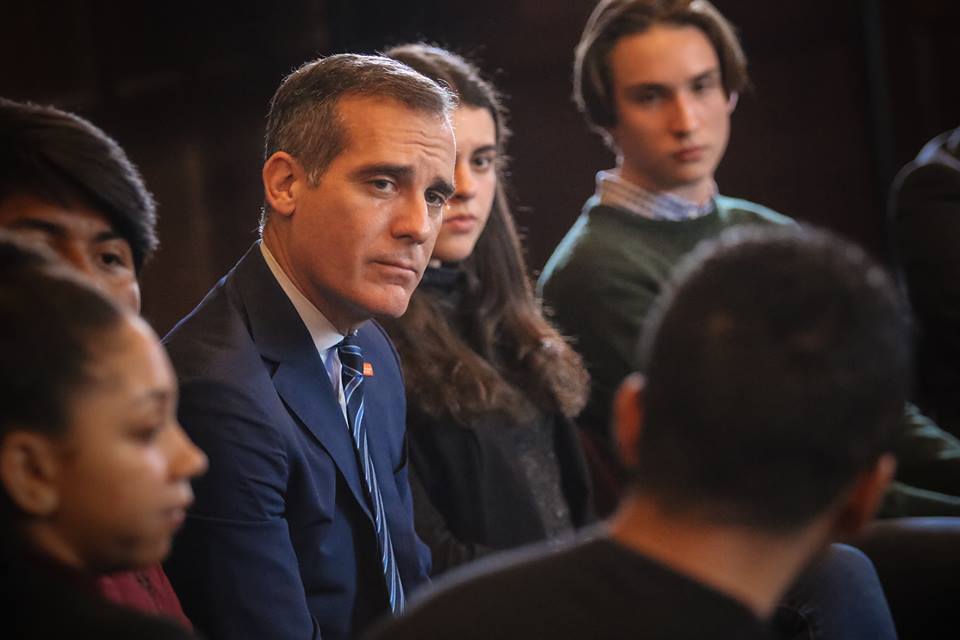
Los Angeles Mayor Eric Garcetti, considering a 2020 presidential run, said Thursday that President Donald Trump has done “plenty of racist things” to divide the nation while failing to deliver on health care reform and other promises.
In an interview with The Associated Press, the two-term Democratic mayor who already has visited the important presidential election states of Iowa and New Hampshire said he intends to make a decision on his candidacy by March.
To oust the president in a 2020 campaign, Garcetti said his party needs to show Trump doesn’t back up his words. He pointed to Trump’s promise to deliver a better health care plan than President Barack Obama’s model. “How’s that going?” he asked.
“We need to show this is not a strong man, this is a thin-skinned and ineffective person who isn’t saying everything wrong, he’s bringing up some good points, but he’s not producing anything,” Garcetti said. “And then the rest of the time he’s dividing us and trying to take things away from us.”
The mayor said that while “racism is something that lives in everybody,” Trump “seems to be much more comfortable with his racism, letting it out.”
“We do have a president, a commander in chief, who is using race to divide us. And not just race -immigration status, geography. He wants to divide us by these kind of essential categories, to point fingers,” Garcetti said.
He stopped short of calling Trump a racist but said “he certainly has done plenty of racist things.” Garcetti said it’s important for the public to know if Trump used the N-word as alleged by fired White House aide Omarosa Manigault Newman.
In the wide-ranging interview, the mayor touched on issues from the city’s homelessness crisis to immigration. He did not join some other Democrats in calling for the abolition of Immigration and Customs Enforcement but said its mission must be changed.
“We have political leadership that has given ICE this mission that is destructive to families, to economies and to even the safety on our streets,” he said.
No candidate has ever ascended directly from a mayor’s office to the presidency, but Garcetti has argued that the work of mayors is essentially the type of chief executive work a president does. And in his case, he’s overseen a city in a metropolitan area that has a roughly trillion-dollar economy, behind only Tokyo and New York.
When asked about the characteristics a candidate would need to topple Trump in 2020, he appeared to describe himself in saying America needs someone not prone to theatrics and who listens more than speaks.
“President Trump is a great insulter. He’s a pretty practiced bully. But I think American people don’t want just somebody fighting with President Trump. They want somebody listening to them,” he said.
“Average American people are just looking to connect with someone they trust. I don’t think they trust Trump at the level that they did, even those who like him,” he said.
Garcetti added he “can fire it up too,” though he’s known for a polished, mannerly disposition.
Strongly Democratic California has been a mainstay in the so-called Trump resistance, but Garcetti said Trump’s tenure has amounted to more threats than any broad change in the way the city conducts business.
Should he run for president, the expected crowded Democratic field could include fellow Californian Kamala Harris, a first-term U.S. senator and former state attorney general. Garcetti called her a dear friend and said what she does won’t influence his decision.
One of Garcetti’s signature accomplishments as mayor was helping craft a successful plan to bring the 2028 Summer Olympics to Los Angeles, after ceding the 2024 Games to rival Paris. He predicts the transportation improvements and construction in advance of the Games will change the face of the city.
He said development around the 1932 and 1984 Games in LA were “the times when we really rebuilt” Los Angeles.
Even as he heralds the Olympics, an expanded commuter rail system and a revitalized downtown, Garcetti faces a homeless crisis that is vast, costly and heart-wrenching. Thousands of transients, most addicted to drugs or mentally ill, regularly camp on sidewalks in an area of town known as Skid Row. Homeless people often sprawl on the lawn outside City Hall.
Garcetti said he was awakened Thursday by an apparently homeless person screaming on his block. He blames the state and federal governments for not doing more to help cities like Los Angeles develop innovative ways to get homeless the help they need.
In one case, he said an alcoholic homeless woman was picked up by LA authorities 155 times and simply recycled back onto the streets until she was moved into a city program in March that aims to get people like her funneled into treatment programs tailored to their needs.
Los Angeles voters have approved spending over $1 billion to construct housing for the homeless, but when will residents begin to see a change?
“Not soon enough for me,” the mayor said, without providing any date.